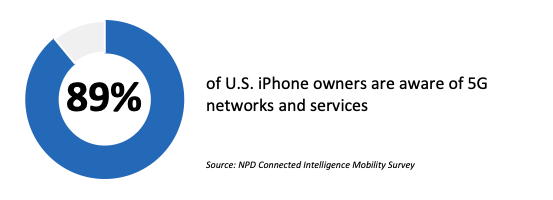
T-Mobile and AT&T launch low-cost prepaid plans
The Uncarrier’s previously-announced T-Mobile Connect low-cost prepaid plan launched earlier than expected due to the COVID-19 pandemic. First announced during the merger trial as part of T-Mobile's "5G for the good" initiative, this low-cost wireless plan starts at just $15 a month for 5G connectivity. It includes unlimited talk and text but limits data usage to only 2GB. The upper tier plan is priced at $25 for 5GB of cellular data per month. Notably, T-Mobile will reward loyalty with an additional 500MB data allowance increase per year over the next five years. The new plan is also available (for a limited-time) through the carrier’s main prepaid arm, Metro by T-Mobile. No doubt in response to this launch, AT&T introduced a similar plan available through its AT&T Prepaid and Cricket brands, though AT&T’s version does not provide customers with access to 5G networks.
The NPD Take:
- The new T-Mobile Connect plan once again shows T-Mobile's influence on the mobile market and its willingness to break from the norm. The aggressive pricing will put immense pressure on prepaid ARPUs, which have been showing slight growth promise due to the increase in unlimited plan adoption. AT&T’s rapid reaction was expected given it needs to protect turf as the nation’s fastest growing prepaid provider. However, it will be difficult for prepaid MVNOs to react as quickly considering they operate on slighter margins due to their wholesale agreements in place with network providers.
- T-Mobile and AT&T’s aggressive prepaid pricing will have a derivative impact on Dish Network’s business model as it has agreed to acquire Sprint’s Boost Mobile brand, which has over 8 million customers. Boost Mobile has yet to respond to these new rate plans, and Dish Network may end up with less customers if T-Mobile and AT&T succeed in attracting them.
Apple may postpone 5G iPhone launch
Several news sites last week reported speculations about Apple possibly revisiting its launch plans and scheudule for its upcoming 5G-powered iPhones. Sources claim that the general WFH (work-from-home) policies coupled by supply deficiencies and travel restrictions make it difficult for Apple to meet the product development schedule due September 2020. The speculated delay is also fueled by the downturn in overall demand for mobile phones. Apple, which relies heavily on its retail distribution, has closed down all retail stores across the globe except China.
The NPD Take:
- Smartphone upgrade/replacement cycles are longer than ever and have an obvious impact on new sales volumes, which have been declining for the last two years. 2020 started well, but the impact of COVID-19 has been to all but kill demand, meaning we should brace for another year of contraction in smartphone sales regardless of Apple delaying its upcoming flagship.
- Apple’s possible delay with its 5G-powered iPhone will be a huge blow to carriers who are banking on Apple’s ability to boost the 5G adoption in the U.S. market. As we recently noted, 5G smartphones accounted for less than 1 percent of total smartphone sales in the US market and the entire industry has been looking up to Apple’s upcoming 5G iPhone as the inflection point for 5G adoption.
Huawei debuts the P40 flagship models
The world’s number three smartphone manufacturer, Huawei, last week announced the launch of its new P40 flagship series. The OEM, like Samsung, launched three version of the new series; the P40, P40 Pro and P40 Plus with prices ranging from $870 and $1500. Like the other P series phones, the 5G-powered P40 excels in imaging: the topline P40 Pro model boast a 50 megapixel main lens along with a 40 megapixel ultra-wide lens and offers a 20x hybrid zoom and 100x maximum zoom. The catch, of course, is that like any new Huawei smartphone launched since late 2018, the P40 does not support Google apps including the Google Play Store library. Huawei customers can download alternatives apps through Huawei’s own app stores.
The NPD Take:
- Huawei is on the U.S. government’s Entity list, which is a listing of foreign corporations that U.S. corporations should not do business with because they pose a national security threat to the U.S. government, thus new phones launched by Huawei will have zero impact in the U.S. market.